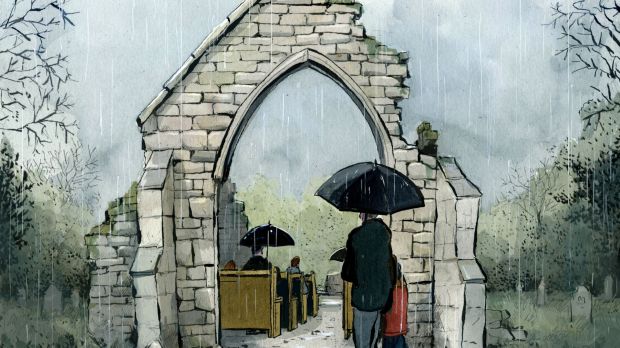Sit the snowflakes down
Sir: I was surprised to read Theo Hobson’s article about ‘snowflake’ Christians in the C of E (‘Holy snowflakes’, 14 April). What most struck me was the timidity of the clergy, who instead of explaining Christian teaching to their gay and other ‘snowflake’ parishioners, merely kowtowed to them by removing a collage depicting an exorcism. Clergy need to teach those who are easily offended that nowhere in the Christian Gospels — as my many readings tell me — does Jesus condemn gays. (That condemnation belongs to the Old Testament, where God commissioned Abraham and the Patriarchs to breed abundantly and build a nation. But as gay relationships do not produce children, they were forbidden as a waste of ‘seed’, along with the ‘sodomite’ practices associated with pagan temple prostitution.)
Jesus Christ’s central message in the New Testament, conversely, is one of grace, love and forgiveness for all, without regard to gender or sexual orientation.
And ‘sin’ has to do with murder, cruelty, greed, robbery, self-indulgence, and oppression of the poor, among other things — only with sex if it exploits others rather than being an expression of love. So please, ladies and gentlemen of the cloth, educate and explain things to your ‘snowflakes’ — and don’t just cave in to them.
Dr Allan Chapman
Oxford
Good news is no news
Sir: Lionel Shriver is right that optimism appears pallid, catastrophism invigorating (‘Catastrophising is my idea of a good time’, 14 April). As John Stuart Mill said, it is not the person who hopes when others despair but the person who despairs when others hope who is regarded as a sage. In the eight years since I published a book arguing that the world was on the whole getting better all the time, I have been asked every year by those hosting talks, how come I still believe in my thesis in the light of, for example, Afghanistan, the euro crisis, Libya, ebola, Crimea, migration, Syria, plastic, Trump, or whatever is the crise du jour. Bad news is sudden, good news gradual, I reply.
Matt Ridley
Newcastle
Broken railways
Sir: Mary Wakefield makes many complaints about Virgin Trains which hit the mark, from their puerile advertising to their unappealing, unfriendly lavatory design (7 April). However, allowing them to end their East Coast service early is a ‘bailout of private enterprise’ only on a simplistic analysis. They and Stagecoach have paid vast fees to the government under their contract. In this way, the government exploits its legislative and regulatory power to extract enormous sums from railway companies. Passed on to passengers, this undermines the economics of such devices. We saw the same before with GNER, whose excellent service was doomed by its payments to government. It is fair that transport providers should pay to use shared resources such as infrastructure. However, exploiting this in a way which promises large sums and ends up with broken contracts, overpriced tickets and frustrated passengers is a practice which is ethically doubtful, and has proven not to work on a grand scale.
Christopher Ruane
Lanark
Educating Taki
Sir: Taki (High Life, 14 April) is mistaken when he suggests that erotic interpretations of Achilles’ relationship with Patroclus are a modern aberration. For the ancients, the question was not whether Achilles and Patroclus frolicked ‘in the tent and under the sheets’ as he so memorably phrases it, but which of them took the role of the lover (‘erastes’) and which the beloved (‘erumenos’) when they inevitably did. Aeschylus presented warrior Achilles as the lover in his ‘Myrmidons’, whereas Plato’s Symposium has Phaedrus argue that the older Patroclus surely assumed the active position. Xenophon was a lone voice in seeing the pair’s bond as a chaste one.
As for Taki’s suggestion that the inevitable next step would be inserting transgenderism into the canon, there is no need — again the Greeks are far ahead of us. The prophet Tiresias famously spent seven years as a woman before returning to a male form, and Aphrodite and Hermes’ child (Hermaphroditus) was often depicted with both sets of genitalia.
Perhaps Peter Jones could help refresh Taki’s memory of a few of the finer points of his homeland’s mythology.
Emma Lyons
Bath
But how was the play?
Sir: Following Toby Young’s article on funerals and the letter last week, I thought you might like to hear another example of British phlegm. My stepson, who is now a successful theatre director, was an assistant at Chichester Theatre. The audience tends to be predominantly pensioners. A few years ago when he was closing up the theatre, he noticed two people still in their seats. When he approached them the lady was very apologetic. ‘I think my husband died in the first act,’ she said, ‘but we didn’t want to cause a fuss.’ He was indeed declared dead on arrival at the hospital, and my stepson could not but admire her stoicism. I particularly admired the fact that she thought ‘we’ didn’t want to cause a fuss.
Johnny Cameron
Fyfield, Wiltshire
His life and his fart
Sir: Stuart Jeffries (Books, 7 April) asks whether farting in public is one of the human rights the French fought for in 1789. If so, it had not arrived by the time Balzac began to write, because he said he wanted to become so famous he could fart in public with impunity.
Michael Barber
London SW20
Got something to add? Join the discussion and comment below.
Get 10 issues for just $10
Subscribe to The Spectator Australia today for the next 10 magazine issues, plus full online access, for just $10.
You might disagree with half of it, but you’ll enjoy reading all of it. Try your first month for free, then just $2 a week for the remainder of your first year.













Comments
Don't miss out
Join the conversation with other Spectator Australia readers. Subscribe to leave a comment.
SUBSCRIBEAlready a subscriber? Log in